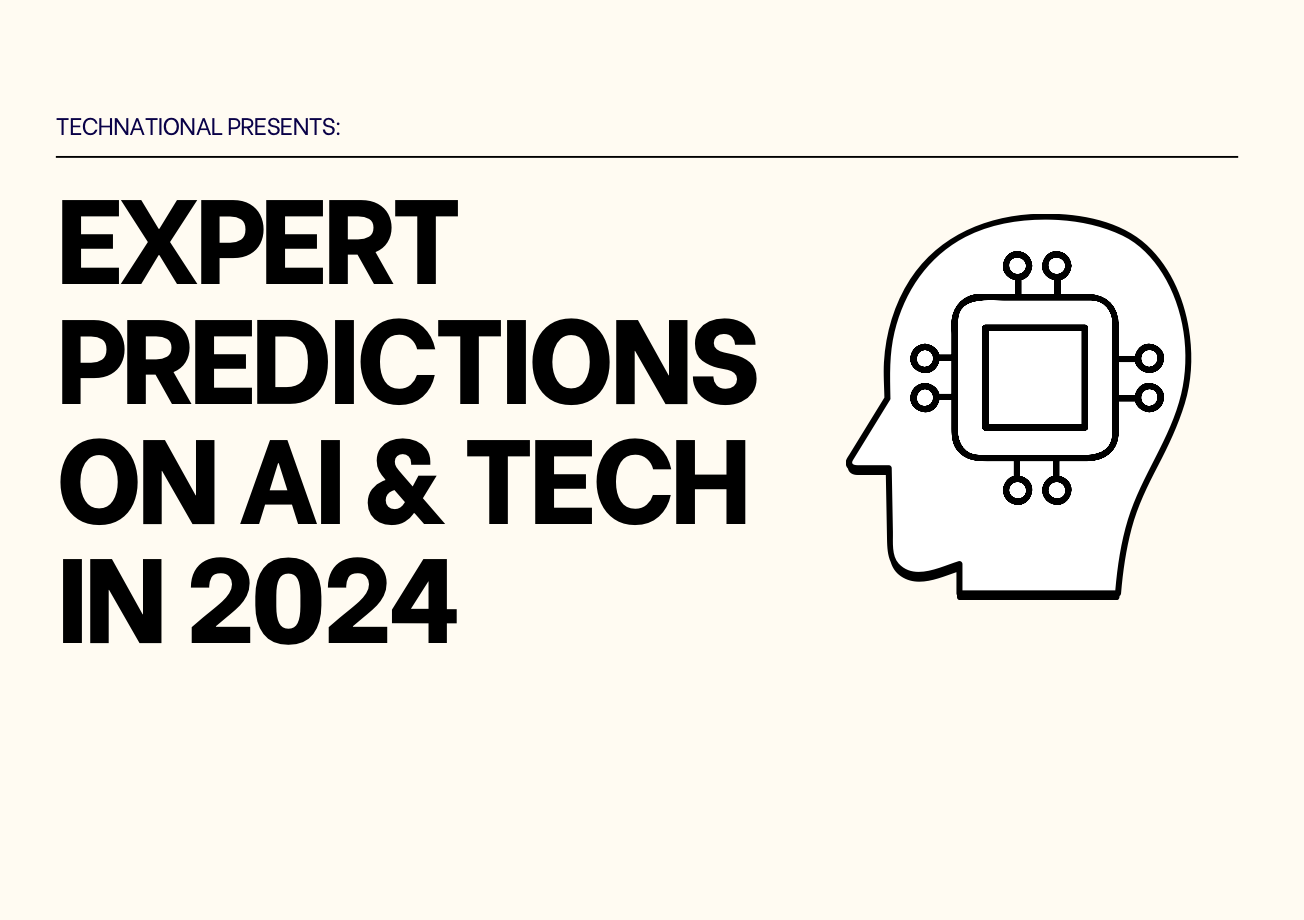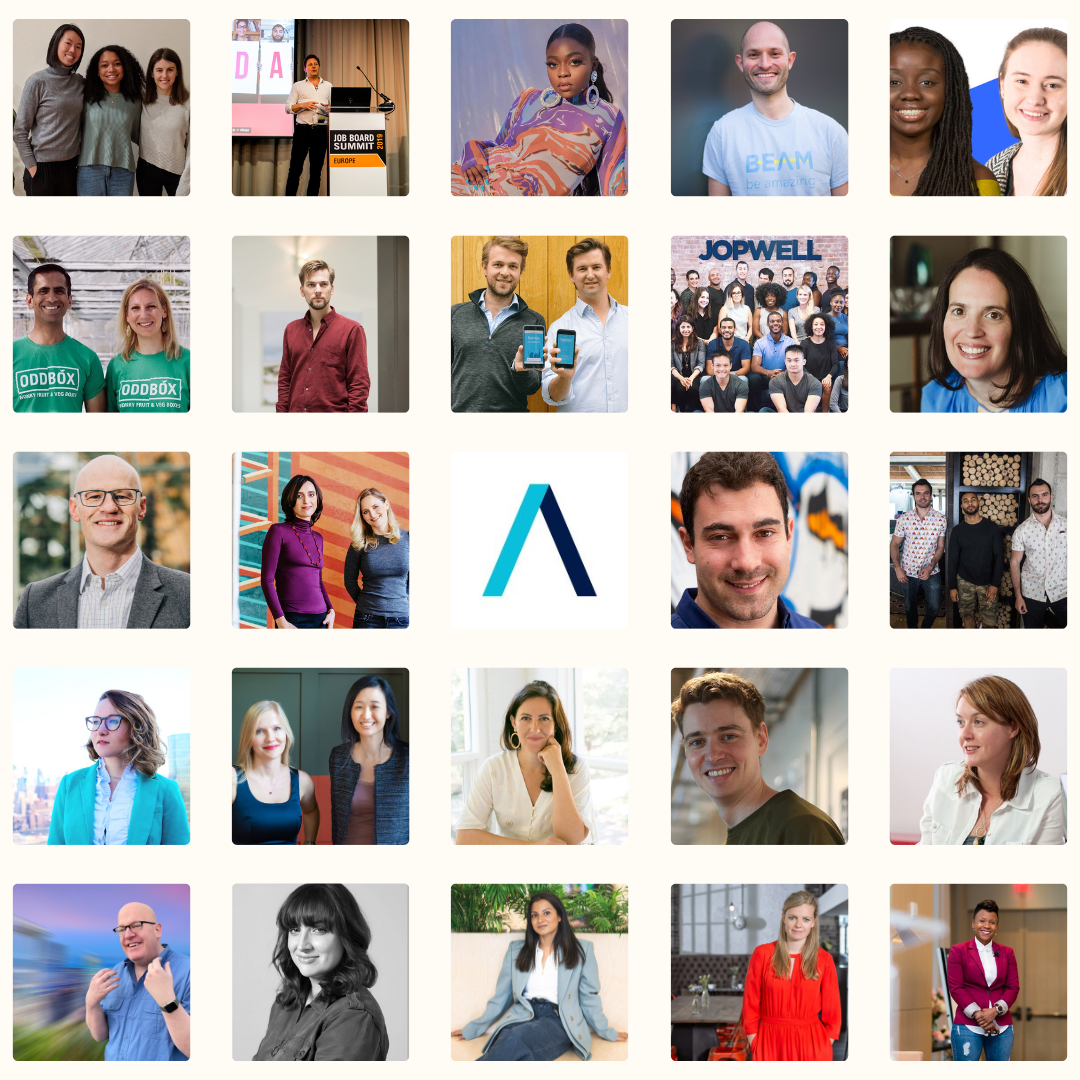Last week, we had the opportunity to gain insights into what to expect in the new year within the realm of cybersecurity. This week, TechNational asked a panel of industry experts to unveil their insightful predictions into the ever-evolving landscape of AI & Tech.
Our Panel of Experts
- Daljit Singh, CDO at ANNA Money
- Zsuzsa Kecsmar, co-founder and CSO at Antavo
- Jess Dickenson, COO of Precis Digital
- Richard Michie, CEO of The Marketing Optimist
- Eric Topham, Co-founder and CEO of octaipipe.ai
- Zoe Bucknell, CEO of global legal entity governance SaaS provider, Kuberno
- Matt Sherwen, founder of Sherwen Studios
- Tony Craddock, Director General, The Payments Association
- Scott Dawson, Head of Sales and Strategic Partnerships, DECTA
For any questions, comments or features, please contact us directly.

Daljit Singh, CDO at ANNA Money

"Nope, I’m not going to tell you that robots will be running banks and you’ll all have a payment chip implanted in your finger tip. My prediction for the year to come is that AI-powered finance tools are going to get REALLY boring. And that’s actually great news. Because boring AI is going to revolutionise your day-to-day financial tasks in 2024.
Imagine an AI autonomous agent dedicated to ensuring you never miss paying a bill, especially those annoying parking fines. It'll keep you on track, avoiding any late fees. And it’ll swap money from your savings account to your current account if you’re about to exceed your overdraft limit. Glamorous? No. But very handy.
Then consider an AI invoicing assistant – an absolute lifesaver for anyone handling billing. It autonomously sends out your invoices and diligently chases them, so you don’t have to. Everything is handled seamlessly and efficiently.
This move towards practical, “boring” AI will become so handy (and crucially, completely unthreatening) that it will reach a tipping point in the next 12 months. Getting bots to do these simple, repetitive tasks for us will become the norm, while we focus on more creative and strategic decisions - like what we’re going to have for lunch."
Zsuzsa Kecsmar, co-founder and CSO at Antavo

“Just as AI dominated the tech scene in 2023, the debate over ethical AI and its impact on human jobs will continue into next year, however I expect that it will quickly become clearer how AI can serve human teams when used effectively. Opportunities will open up for those who can harness and amplify AI’s potential and tech teams that can get ahead of the curve will gain a competitive edge.
The discussion around the safe and responsible use of AI will continue to be a focus and links closely to cybersecurity in 2024. Data usage and privacy compliance are just two examples of the cross section between AI and security and businesses will need to ensure that they are using the power of AI responsibly so as to not fall foul of breaches.
Another expected trend for 2024 is the evolution of legacy technology to SaaS, particularly in marketing technology and loyalty programmes, which is where Antavo operates. Many systems here were started in the 2010s and are in need of reform to keep pace with modern customer demands. Legacy tech will be increasingly phased out as businesses put greater focus on fit-for-purpose systems that deliver better results. With the rising cost of doing business hindering profitability and the cost of living hike impacting customer spend, it will be imperative for businesses to invest in order to survive and evolving legacy tech is a fundamental part of this.
Any legacy tech evolution poses risks to IT jobs and this trend could impact the level of resources that are needed in-house. We may see a talent shift into vendor tech teams that reflects this change.”
Jess Dickenson, COO of Precis Digital

Gen AI will become a fundamental tool:
"By the end of next year we will hardly remember life without Gen AI. Taking the plunge is the hardest part but once businesses do, it will radically change day to day operations. Gen AI will save time across data, creative and content teams. Focuses will shift from inception phases and towards quality checking and tweaking the output from Gen AI tools."
Brands will have to work harder to target audiences:
"With the deprecation of 3rd party cookies, advertisers will have to work harder to target audiences. In a world of broad audiences, creative becomes the method of reaching your target audience. Designing with the audience in mind and having diversity in the creatives allows bidding algorithms to effectively reach the right users."
Budgets will shift to Connected TV:
"Compared to linear TV, Connected TV offers advertisers a more targeted and economical way to reach viewers. It’s also more accessible - you can buy it programmatically and digital assets can be created without the price tag that comes with TV advertising. With changes in SVOD models, such as Netflix’s ad-tier, we will see advertisers continue to test the waters with CTV."
Whilst AI if preferred, platforms will start to give advertisers more control:
"It seems like media platforms are finally listening to advertisers' feedback about lack of control - a move I welcome! We can see from Google’s new Demand Gen campaign, as well as Meta’s ability to cherry pick AI-enabled features, advertisers now have more control over black-box campaigns. AI is a powerful tool but for businesses who have spent years building a brand, leaning into options like Meta’s Advantage+ creative doesn’t make sense. Giving back some control allows advertisers to test what works for them."
For any questions, comments or features, please contact us directly.

Richard Michie, CEO of The Marketing Optimist

“SEO in 2024 will be full of AI generated content as business rushes to save money on content creation. I have no doubt about that. That will then give those websites which invest in customer-centric content created with real insight, understanding and empathy for the customers and business – and created by humans – a huge advantage.
AI is great at doing the work which humans aren’t very good at, like crunching numbers, sifting data, doing quick research. Humans are brilliant communicators, and humans buy from humans. So why any business would subcontract their most important asset to software which is scraping and mimicking content created for someone else makes no sense. Would you swap your sales team for automated messages? I’m guessing not. So why would you let ChatGPT write your content for your most important documents on the internet?
In 2024 Google, and importantly people, will want to see the well written and created content on websites. Business can look at all the other bells and whistles they like but this fact won’t change. My advice for the new year is the same as last and every year before. Invest in great ideas that solve your customers problems and create content that helps them out. I don’t advise taking short cuts that help you join the race to the bottom.”
Matt Sherwen, founder of Sherwen Studios

“This year, there was a mainstream adoption of AI tools, particular within the eCommerce sector as retailers took advantage of third-party plugins that offered to do everything from generating product descriptions to inventory management and interactive chatbots.
Those AI plugins almost certainly save valuable time and money, but there is also potential for a myriad of risks, from cybersecurity through to reputational damage.
We predict that 2024 will almost certainly focus on the development of new legislation and regulation surrounding the use of AI. This could be everything from having to publicly state when/where AI has been used, to licencing restrictions for AI software that has been verified as being safe to use.
Within the push for legislation and regulation, there will an internal focus on employee education. Staff need to know which AI tools and plugins are safe to use and which are ethically-minded and reputable.
When used correctly, AI is undoubtedly a powerful force, but it also has the potential to escalate problems and cause significant harm.
We’ve seen companies experimenting with generative AI, with many failing to realise how their potential unconscious bias can derail the results, creating the risk of long-term reputational damage. If staff continue to use unauthorised tools, they could also be risking confidential data on an OpenAI platform, or inadvertently creating vulnerabilities within their systems that could be exploited.
Although we applaud AI's accessibility and its ability to level the playing field for smaller firms across all sectors, we believe 2024 will be a year of caution and regulation. By prioritising safety first and foremost, firms can have greater confidence that their technical foundations will deliver business growth.”
Zoe Bucknell, CEO of global legal entity governance SaaS provider, Kuberno

“Governance and compliance functions are decades behind other business functions in technological adoption, making them ripe for disruption. This process is already underway and will continue to intensify next year.
A major catalyst is the fact that secretariat teams have long been under-resourced, but with the advent of ESG and additional reporting requirements, the demands on them have intensified and become significantly more complex. Unable to grow their teams in a tight economy, governance professionals can only turn to technology to bridge the gap. Where implementing tech was previously considered a choice, it will soon be considered a necessity.
In particular, teams will become especially reliant on legal entity management tools to automate burdensome administrative and bureaucratic tasks to increase their capacity. Leveraging this technology will lead to professionals spending more time on the strategic aspects of their role as professionals are better equipped by the data at their fingertips to make decisions - and do so more quickly.
One of the major barriers to technology adoption so far has been lack of knowledge around the products available and resistance to change. This is quickly changing, but there will still be some late adopters who are reluctant to change their ingrained habits. Though, they will find themselves in an ever-shrinking minority.”
Eric Topham, Co-founder and CEO of octaipipe.ai

"2023 was a tipping point. Where the power and utility of Artificial Intelligence became accepted and adopted across most industry sectors. AI has tremendous potential across critical infrastructure to reduce costs, improve efficiencies and increase performance. For energy alone, the UK government’s digitisation strategy estimates AI, if fully harnessed, could reduce energy system costs by £30-70bn by 2050.
Modern societies rely on critical and digital infrastructure – we depend on resilient, efficient and secure energy networks, water systems, built environment and security solutions. So it’s vital that critical infrastructure companies and organisations manage the performance, health and security of their assets to keep them secure and working optimally.
Federated Learning Operations (FL-Ops) has emerged as a transformative technology in AI that addresses a fundamental concern in our digital age: data privacy and security. In 2024, I expect FL-Ops to continue its march towards wider adoption in edge computing, whereby data is processed at scale and models are trained directly on the device, to reduce latency and dependence on central servers and preserve the integrity of the data in those systems.
In addition, I feel a sector-specific approach to cyber resilience and AI legislation would be beneficial, over a more horizontal approach that's favoured by the EU, however it would need similar rules applied to a host of industry sectors for the benefits to be utilised."
For any questions, comments or features, please contact us directly.

Scott Dawson, Head of Sales and Strategic Partnerships, DECTA

“The payments industry has been using ‘artificial intelligence’ and machine learning for years – every time you make a payment, anti-fraud checks are carried out by what are effectively AIs, and it’s been this way for years. The current craze for AI comes from generative AIs – systems like ChatGPT and Midijourney that allow users to prompt a system to create realistic-seeming writing or images – and there are currently limited applications for this particular technology for many businesses. Few organisations are losing money because they can’t create enough written content – their pain points come from high costs, high inflation rates and low consumption, which AI is not able to address. There is huge potential in automation, as we have seen in the payments industry, but as with many advancements they are unlikely to be flashy, and the real progress will happen through automating time-intensive processes rather than deploying sci-fi style artificial general intelligence. As with so many things, we need to get serious about increasing productivity through building upon the AI systems that have been producing value for years rather than chasing a moonshot.
The industry has had an interesting year, with many organisations feeling the impact of economic and political events globally, from high costs and even higher inflation rates to low consumption. AI is the one standout topic in 2023 that got everyone talking and while the basis of the technology has been around for many years, it was in 2023 that it really took off and became a household term, and that is in large part thanks to ChatGPT, which celebrates its first anniversary at the end of the year. That being said, the technology hasn’t changed the world as much as we thought it would - both the threats and benefits of AI are being somewhat oversold as it is not able to address the key difficulties that many organisations experienced this year.
Looking forward to 2024 we’ll be looking at the regulation of AI. It is not so much the technology that is regulated but the structure of it, which is indicative of the fact that regulation will never be able to keep up with technology that evolves this quickly, or foresee what it might be capable of.”
Tony Craddock, Director General, The Payments Association

“The rise of certain technologies like generative AI in 2023 has heralded a great deal of transformative change that will shape how the payments industry develops in 2024. As these changes become more apparent, it is imperative that the payments sector cooperates to enable consumers to pay and be paid securely and conveniently. The three factors that will inform the payments sector over the next year will be the rise of innovative digital currencies, the new initiatives that will serve to combat APP fraud, and the importance of proportionate regulation. All three of these were highlighted in The Payment Association’s Payments Manifesto.
It’s imperative that we foster a flourishing digital currencies ecosystem, starting with stablecoins, or S-Money, as it is now known. This requires global interoperability, ensuring seamless transactions across borders and platforms. We must also attract talent and investment from around the world to fuel innovation and growth in this burgeoning space. In short, we need to run towards innovation, not away from it. Meanwhile, we must constantly err towards the best interests of the consumer and that means combatting APP fraud, which has become a significant threat to the integrity of our services. Cross-industry data sharing is essential to effectively identify and prevent fraudulent activities. By working together, we can safeguard consumers and businesses alike.
Finally, we must strike a balance between innovation and regulation. In recent years, the regulatory pendulum has swung so far towards consumer protection that the entrepreneurial fire of innovation is being snuffed out. A proportionate regulatory framework is crucial to fostering responsible growth and protecting consumer interests. We must avoid stifling innovation with overly burdensome rules and enforcement of them while also ensuring that our systems remain sufficiently safe and secure. By embracing innovation, collaborating to combat fraud, and advocating for proportionate regulation, 2024 can be a year where payments are more secure, convenient and accessible to all.
Thinking even further into the future, here are my additional predictions:
Open Banking: In the face of rapidly increasing fraud and new regulations around consumer duty, Third Party Payment Providers (TPPs) will need to implement enhanced fraud prevention tools to drive confidence in open banking payments and protect consumers against losses (like card scheme-based liability protection mechanisms, including chargeback dispute resolution). As the growing need for consumer protection increases the cost of open banking payments, the business case for such payments will be diminished for merchants.
Open Finance: As companies recognise the potential of data and AI, they will refocus their open banking efforts from payment initiation (Payment Initiation Service Provider - PISP) to data utilisation (Account Information Service Provider - AISP) to improve accuracy, efficiency, and customer experience. The data angle will become even more beneficial as we evolve into Open Finance with the participation of non-bank financial institutions, such as mortgage, insurance, pension, and investment companies.
Wallets: Consumers will increasingly leave the house without physical cards or cash and will demand the acceptance of digital and mobile wallets with biometric authentication to make purchases both online and in person. Merchant failure to accept popular wallets will increasingly result in shopping cart abandonment, which has already reached 70% in the case of eCommerce, due to the friction involved in needing to have the physical card available. Additionally, QR codes will increasingly be introduced across the customer journey, including information, membership, ticketing, loyalty, ordering and payments.
Super Apps: Wallets and digital banks will endeavour to increase their ubiquity, usage, and customer engagement by evolving into super-apps. To achieve this status, they will broaden their service offerings to customers, including investing, lending, savings, loyalty, and P2P payments, as well as embed commerce and high engagement activities through lite apps, such as shopping, ticketing, transportation, delivery, or messaging. Consumers, particularly Gen Z and Millennials, will increasingly adopt such wallets due to subscription fatigue, convenience, and slick user experience.”
Digital Currency: The percentage of UK adults owning cryptocurrency was over 10% in 2022, compared with 4.5% in 2021, which shows a growing interest in crypto assets. In 2022, 28% of non-crypto asset holders said that they would be more likely to buy cryptocurrency if the market was regulated. Additionally, it is becoming much easier to obtain crypto assets through popular wallets, like PayPal and Revolut. As merchants observe this growing trend, they will explore new ways of accepting popular cryptocurrencies, such as Bitcoin and Ethereum to gain a share of spend. As acceptance increases, so will the adoption of crypto assets, creating a flywheel effect. (Note: The figures in the US are more than double that of the UK, which may propel big tech companies in the US to accept cryptocurrencies more widely than in the UK.).








